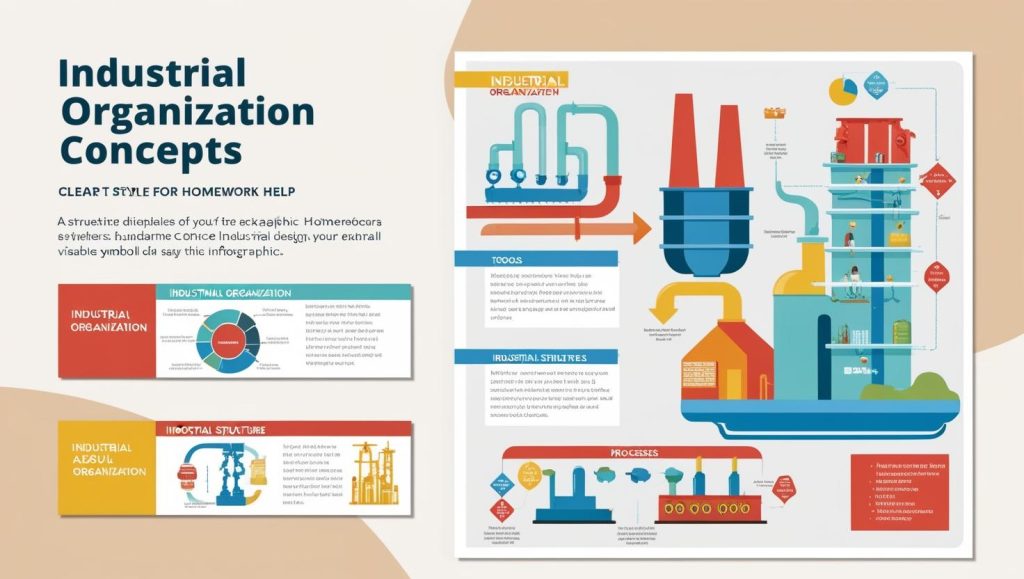Introduction
Industrial organization is a crucial branch of economics that examines the behavior of firms, market structures, and the impact of regulations on industries. This subject requires students to understand economic models, competition theories, and government policies affecting businesses. If you are struggling with assignments, seeking Industrial Organization homework help can significantly improve your grasp of the subject.
In this comprehensive guide, we will discuss key concepts, common challenges, and useful resources for tackling industrial organization assignments. Additionally, we will provide external links to academic sources to enhance your learning.

Understanding Industrial Organization
1. Market Structures
Industrial organization explores different market structures that influence competition and pricing strategies. These include:
- Perfect Competition: Many firms, homogeneous products, and price-taking behavior.
- Monopoly: Single seller, high barriers to entry, and price-setting power.
- Oligopoly: Few dominant firms, strategic interactions, and game theory applications.
- Monopolistic Competition: Many firms with differentiated products and some price control.
Understanding these structures is essential for analyzing real-world market dynamics, making Industrial Organization homework help invaluable for students.
2. Game Theory and Strategic Behavior
Game theory is widely used in industrial organization to analyze strategic interactions among firms. Key concepts include:
- Nash Equilibrium: The optimal strategy where no player benefits from changing their action unilaterally.
- Prisoner’s Dilemma: A situation where rational decision-making leads to suboptimal outcomes.
- Price Wars and Collusion: Firms may engage in aggressive pricing or coordinate strategies to maximize profits.
Studying these concepts helps students understand how firms compete and make decisions in different market settings.
3. Antitrust Laws and Regulation
Governments impose regulations to prevent monopolistic practices and promote fair competition. Key regulations include:
- Sherman Antitrust Act (U.S.): Prohibits monopolization and anti-competitive agreements.
- Clayton Act: Addresses price discrimination and mergers that reduce competition.
- European Competition Law: Regulates anti-competitive behavior within the EU.
Understanding regulatory frameworks is essential for analyzing business policies and their impact on market efficiency.
Common Challenges in Industrial Organization Assignments
Many students find industrial organization assignments challenging due to:
- Mathematical Complexity: Economic models require calculus and game theory applications.
- Data Analysis: Interpreting market data and firm behavior using statistical tools.
- Case Studies: Applying theoretical concepts to real-world business scenarios.
Seeking Industrial Organization homework help can provide valuable assistance in overcoming these difficulties.
How to Find the Best Industrial Organization Homework Help
1. Online Tutoring Platforms
Websites like Khan Academy, Coursera, and edX offer quality courses on industrial organization. Personalized tutoring from platforms like Chegg Tutors and TutorMe can also be beneficial.
2. Academic Resources
Reading research papers from sources like NBER and World Bank can provide in-depth insights. Google Scholar is another excellent tool for accessing relevant literature.
3. Homework Assistance Websites
Platforms like CourseHero, StudyPool, and HomeworkMarket offer expert guidance on industrial organization assignments.
4. University Resources
Many universities provide free online materials, including lecture notes, past papers, and research articles. Exploring your university’s library can be an excellent way to deepen your knowledge.
Tips for Excelling in Industrial Organization
1. Strengthen Your Economic and Mathematical Skills
Since industrial organization is heavily quantitative, it is important to be proficient in calculus, algebra, and statistical analysis. Online courses in mathematics for economists can improve comprehension.
2. Stay Updated on Market Trends
Industrial organization is highly relevant to real-world markets. Reading publications like The Economist, The Financial Times, and Harvard Business Review can help students understand how theoretical concepts apply to real industries.
3. Engage in Discussions and Study Groups
Collaborating with peers can enhance understanding and provide different perspectives on market structures and competition.
4. Seek Expert Assistance
If you find yourself struggling with assignments, reaching out for Industrial Organization homework help from experienced tutors can be immensely beneficial.
Conclusion
Industrial organization is a fascinating and essential field of study that examines how firms operate within different market structures. Mastering this subject requires analytical skills, a deep understanding of economic models, and familiarity with regulatory policies. By leveraging online resources, academic materials, and tutoring services, students can improve their comprehension and excel in their coursework. If you need Industrial Organization homework help, utilizing expert guidance and external resources can significantly improve your academic performance.


